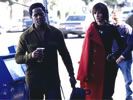Eye For Film >> Movies >> Full Frontal (2003) Film Review
What's infuriating about Full Frontal is that it's too close to real life to make sense. What's invigorating about it is that it doesn't give a damn.
After the high gloss entertainment values of Ocean's Eleven, director Steven Soderbergh wanted to make a little film that cut out the techno baggage which slows the process of moviemaking down. He had a script from his friend Coleman Hough and scribbled down a set of rules for the actors, not unlike Dogme 95, only less serious, which covered getting to work (drive yourself), on-set facilities (no trailers), costumes (choose your own), make up (DIY), improvisation (encouraged) and "You will have fun whether you want to or not".

The film was shot in two-and-a-half weeks, mostly with a digital video camera, using natural light. The result is blurry and dark, often out of focus. The film within the film is made in the conventional way and looks wonderful, with Julia Roberts in a wig, playing a magazine reporter, interviewing a flirtatious black actor (Blair Underwood) for a cover story profile piece.
The reality section is a day-in-the-life-of-media-folk in and around Hollywood. There are similarities with Mike Figgis's Time Code, except Soderbergh does not use split screens, depicting the competitive, bitchy, egocentric world of stressed, alienated, creative people who wouldn't know contentment if it kissed them on the butt.
It concerns, if it concerns anything beyond "a dip in Lake Me", the birthday bash for movie producer Gus (David Duchovny), who appears in only two scenes, flat on his back. The ensemble cast has problems of its own, usually involving unsatisfactory love lives, or marriages on the brink of breakdown.
Writers who write about writing are accused of anal exploration. The same can be said of moviemakers who make movies about making movies. The film within the film is charming, but weightless. The film outside the film has beautifully observed touches, little moments of absurdity and despair that illuminate the transient nature of affection and desire.
Catherine Keener, as a nut-hard celebrity magazine executive, and David Hyde Pierce, as her apologetic writer husband, who worries about losing his hair, are especially fine. The performances gain from free expression and improvisation and Soderbergh's habit of shooting in single takes.
The subplots may appear like short breaths in a packed race and the question, "Why this?", arises briefly before a perverse fascination overwhelms doubts about the value of basics and going back to them.
Reviewed on: 22 May 2003



















